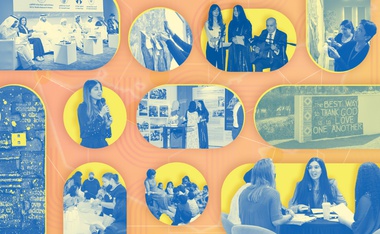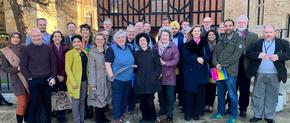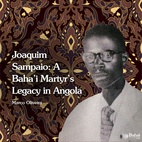The Baha’is of the United Arab Emirates (UAE) have been seeking a new kind of dialogue in which fresh thinking can emerge about the constructive role of religion in contemporary society.
“Religion has a unique role to play in promoting the nobility of people and inspiring humanity to build a prosperous and peaceful civilization,” says Roeia Thabet, member of the Baha’i Office of External Affairs of the UAE.
In an interview with the News Service, Dr. Thabet explores insights and experiences of the Office in its efforts to contribute to the national conversation on this theme.
Promoting a shared identity
In their discussions with other social actors, the Baha’is of the UAE have been exploring the idea that although celebrating diversity and advocating co-existence are important, a shared identity based on the principle of the oneness of humanity is essential for lasting progress.
“Consciousness and acceptance of this principle is needed if humanity is to overcome an entrenched pattern of conflict and move toward a world characterized by harmony and cooperation,” says Dr. Thabet.
The spaces of consultation created by the Office at the national level have brought together various segments of society, including leaders of religious communities, academics, and civil society organizations in inclusive environments that allow diverse perspectives to be harmonized and points of unity amplified.
“Establishing peace is the responsibility of all of humanity, and to achieve this requires the abandonment of every kind of prejudice that allows people to consider themselves superior,” she continues. “These forums inspire hope that, despite differences, people of all backgrounds can take action and change things together.”
Achieving consistency between belief and practice
The Office of External Affairs has found that discussions among religious communities are more productive when participants reflect on the concept of coherence between belief and practice.
This idea was addressed by Dr. Thabet at the 2022 Abu Dhabi International Book Fair, in a forum titled “The Role of Religion in Promoting World Peace,” where she stated that “religion must nurture in people a strong desire to act for the wellbeing of humanity. The fruits of religion can be measured by the extent of its contribution to creating higher degrees of cohesion and peace.”
The Office of External Affairs notes that many of its insights about fostering greater collaboration and strengthening friendships among diverse social actors are drawn from Baha’i community-building efforts.
Dr. Thabet states: “These efforts aim to develop people’s capacity to serve their fellow citizens in consultative environments that are open to all and free of any form of prejudice.”
Through these activities, participants enhance their ability to identify the root causes of social challenges facing their neighborhoods in light of spiritual principles such as justice, the equality of women and men, and the harmony of science and religion.
“In that context,” says Dr. Thabet, “people from different segments of society gain clarity about their purpose in life, cultivate a desire for the well-being of their fellow citizens, and overcome their differences by working together to meet the needs of their neighborhoods in practical and concrete terms.”
The Office of External Affairs plans to continue its exploration of how religion can contribute to social transformation in a series of forums that will be held in the coming months.

















Comments
Sign in or create an account
Continue with Googleor